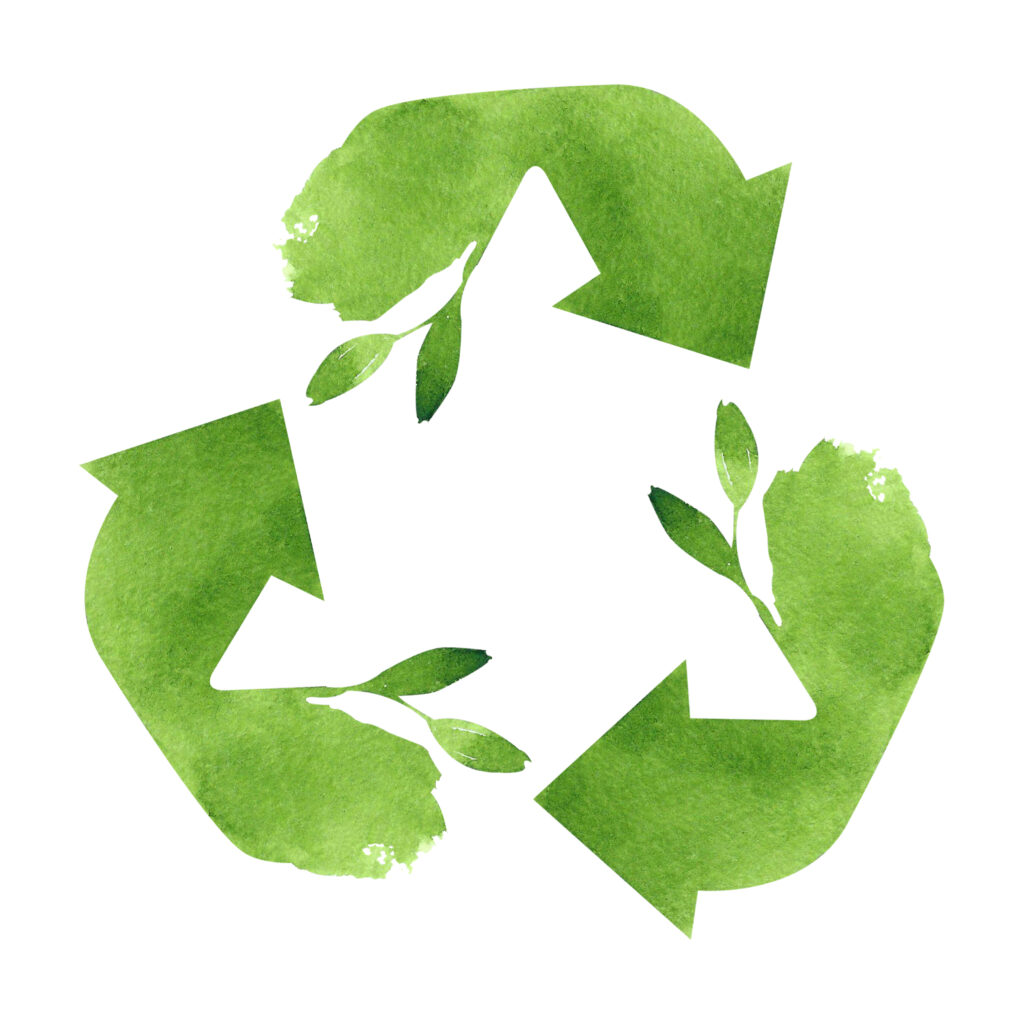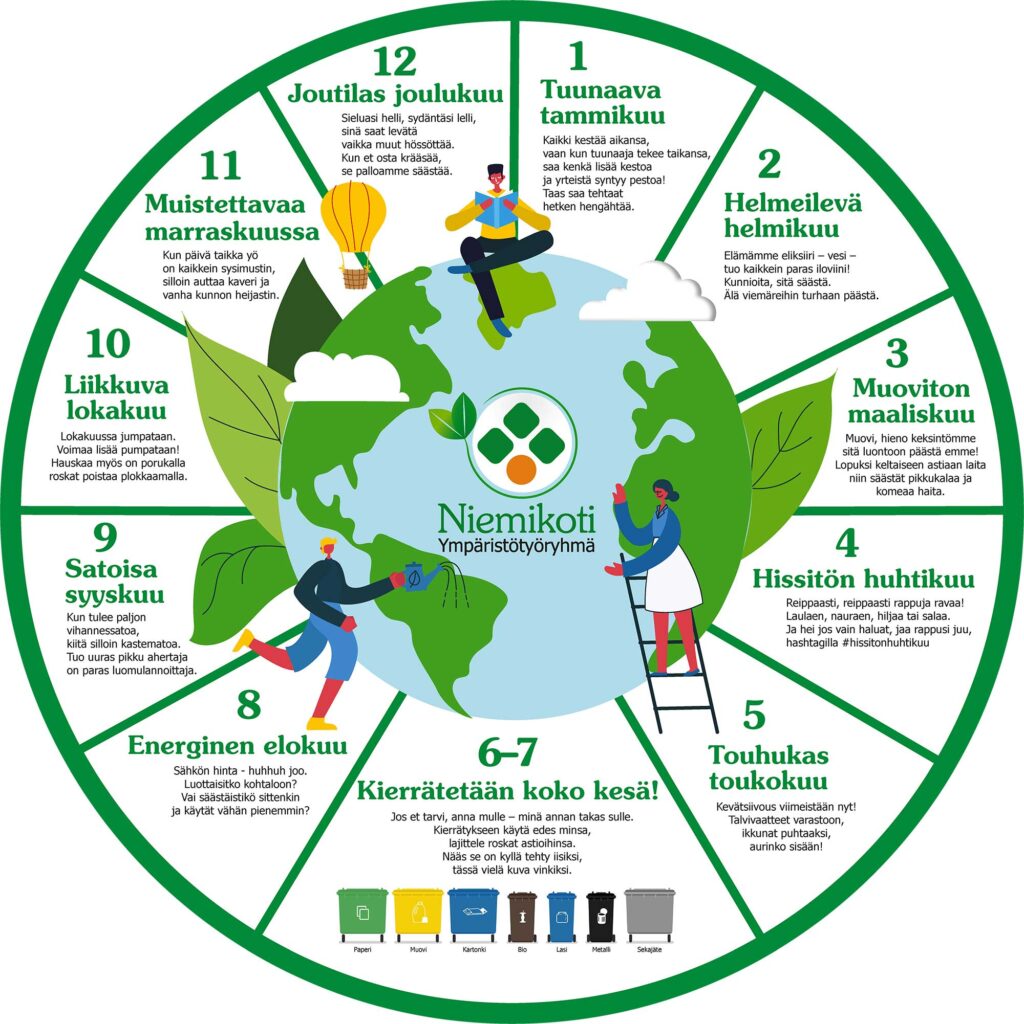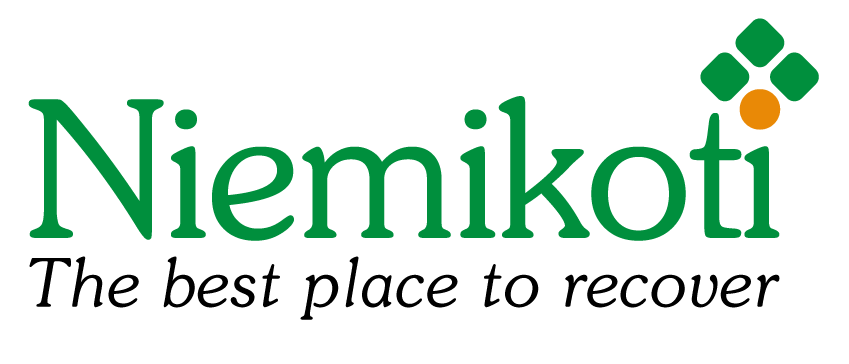Niemikoti Foundation’s Carbon Neutrality Plan
Niemikoti Foundation is committed to ecological, social, and economic sustainability. In environmental matters, we prefer high-quality and durable supplies, making versatile use of recycling. Environmental impact is reduced by sourcing ecologically produced energy whenever possible and by choosing environmentally friendly products for daily use. Environmental work is an integral part of the social and healthcare sector. We want to be a committed and determined actor in this field, promoting and carrying out good environmental practices together with staff, service users, and networks.
Niemikoti Foundation mainly operates in rented premises, which means that we have little direct influence over heating costs and emissions.
Our own service production generates CO2 emissions primarily from maintaining operations and from mandatory purchases. Mobility, procurement, waste management, recycling, and circular economy are at the core of our efforts to achieve carbon neutrality.
Staff commitment to the environmental program—and the changes in personal consumption and behavior that follow—play a significant role in its implementation.
A responsible employee cares about the environment and considers their own carbon footprint with respect for nature. Committed employees also naturally pass on their knowledge and practices to service users in their everyday lives. With 100 employees working alongside 1,600 service users and their networks, responsible practices and environmental awareness can reach a large group of people.
Staff members have been instructed to consider environmental matters in their daily work. The environmental coordinator, key staff, and some eco-support persons have participated in environmental training. Employees have been guided in implementing the environmental program according to their areas of responsibility. For new employees, environmental practices form a dedicated part of the onboarding program (“the first 100 days”), ensuring familiarity with the environmental plan from the beginning.
Steps Towards Carbon Neutrality

1. ECOCOMPASS (environmental management, verified system)
The environmental management system was audited in 11/2020 and is valid until 11/2023. The audit was carried out at Cultural Workshop Elvis, the Eira Housing Services Unit, the Subletting Unit, and the Haaga Activity Center.
2. Responsible Procurement, Circular Economy and Recycling
Responsible Procurement

At Niemikoti Foundation, procurement emphasizes environmental friendliness and other aspects of responsibility, such as social and economic sustainability. Whenever possible, domestic (Finnish) origin is also taken into account in decision-making.
The majority of purchases consist of consumable goods, such as detergents and other everyday items. Niemikoti Foundation’s ICT team has compiled a list of environmentally friendly products from the City of Helsinki Logistics Centre (Stara) catalogue, and units have been instructed to prioritize these products.
When purchasing household appliances, priority is given to those with above-average energy efficiency.
Circular Economy
Furniture and furnishings are preferably purchased from suppliers who also sell lightly used, good-condition items. For new furniture purchases, domestic options are considered whenever possible.
Niemikoti Foundation also operates a goods exchange, where units can list items, furniture, and equipment they no longer need so that others can make use of them.
Recycling and Waste Sorting
Each unit reduces the amount of mixed waste by acquiring appropriate collection containers for sorting. Waste volumes are monitored, and containers for different waste types are provided only according to actual need. Local collection points are also used for small amounts of waste, such as batteries or glass, when the quantity generated in a unit is so small that ordering a separate collection container would create a larger environmental burden than delivering the waste to a nearby collection point.
3. Preventing Food Waste and Our Own Green Care Production

Food waste is continuously monitored, and plans are made to reduce it, increase the use of vegetarian food, and make better use of seasonal products in the Foundation’s units. Locally produced ingredients and Finnish origin are given priority whenever possible.
Green Care activities are being expanded through staff training and cooperation with other Green Care actors (for example, the Green City Farm agreement). The aim is to develop new methods to support rehabilitation and, in practical terms, to increase the share of locally grown vegetables produced by the Foundation itself for daily consumption.
4. Energy
The electricity used by Niemikoti Foundation is certified hydropower. Electricity contracts cover all of the Foundation’s operations.

Niemikoti Foundation’s leased car fleet currently consists of hybrid cars. The existing contracts will expire at the end of 2022, after which the fleet will be converted to electric vehicles whenever possible. Company vans have been replaced with newer models, though their emissions are still relatively high. This can be addressed through training that promotes the most economical driving practices.
There is little opportunity to influence district heating emissions in the properties used by the Foundation. The property on Linnavuorentie is heated with oil, and a plan is underway to switch the heating system to a more environmentally friendly option. Since the property is owned by the City of Helsinki, the city will also benefit from the transition.
In the Foundation’s properties and units, both staff and service users are guided to adopt energy-saving practices, such as avoiding unnecessary use of hot water and keeping windows or doors open continuously.
Staff members also participate annually in the Kilometer Competition and, together with service users, plan, carry out, and take part in a variety of physical activity campaigns.
5. Increasing Competence, Communication and Incentives
At Niemikoti Foundation, special emphasis is placed on communication and information sharing about environmental work. This is done, among other things, through so-called theme months. The environmental working group highlights 11 different themes, which are communicated both internally and externally. The theme months also include various motivating competitions, and the themes are actively integrated into the daily lives of service users.
- Tune-Up January (upcycling Christmas food, clothes, and gifts; Dry January and other New Year’s resolutions)
- Flowing February (water consumption)
- Plastic-Free March (plastic recycling and sorting)
- Stairway April (increasing everyday exercise, physical activity challenge)
- Thorough May (spring cleaning, environmentally friendly detergents)
- Recycling June (introducing recycling centers, libraries, and rental services)
- Energy-Saving August (monitoring and reducing electricity use)
- Harvest September (seasonal, locally produced food)
- Active October (adding more exercise to everyday life)
- Mindful November (reflectors, safety, and awareness)
- Joyful December (challenging consumerism, self-care and well-being)

